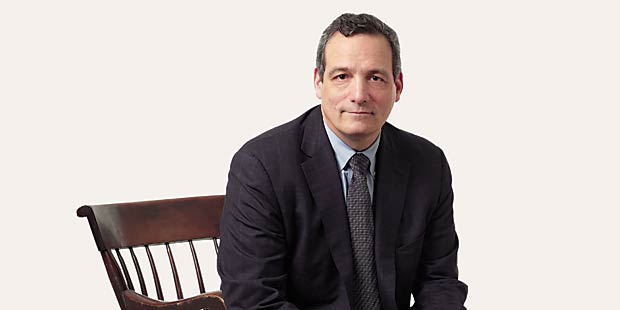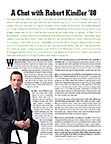A Chat with Robert Kindler ’80
Printer Friendly VersionFor a guy who has been at the top of both Big Law and Wall Street, Robert Kindler has a pretty idiosyncratic background. Start with the fact that he majored in romantic poetry and music in college (he was recruited to Colgate because of his talents on the flute). He briefly dropped out of law school and went to work for his father’s plumbing company because he wasn’t sure a legal career was for him. And he once owned an ice cream shop in Katonah, in New York’s Westchester County, where he could have all the coffee ice cream he wanted. • Since then, each career choice has led Kindler in only one direction: up. He worked at Cravath, Swaine & Moore for 20 years—from 1980 to 2000—ultimately running the firm’s mergers and acquisitions business. Then he jumped the fence and became an investment banker, first at Chase Manhattan for nearly six years—rising to global head of M & A at JPMorgan Chase—and more recently at Morgan Stanley, where he is vice chairman and global head of M & A. Kindler sat down in February with writer Duff McDonald to talk dollars and sense.
What are the differences between law and banking other than the money?
When I was at Cravath, the culture of the firm was that a partner, no matter how senior, needed to read every document—and every word of every document. So as a partner at Cravath, you were still negotiating merger agreements. As a banker, you are not doing that kind of work; it is much more about your interpersonal skills, plotting strategy, and being out meeting with clients. I find that far more interesting. But on the downside, you travel a lot more as a banker. I’m on the road at least three days a week. And I didn’t do that as a lawyer.
So, then…J.D. or M.B.A.?
You can’t go wrong with either degree or even a combined degree. There are a lot of people in the M & A group at Morgan Stanley who have legal degrees. Getting a law degree is great training and doesn’t stop you from getting into banking—it might even help you. The business world is filled with people with law degrees. James Gorman, the CEO of Morgan Stanley, has one. Having said that, M.B.A.
What advice would you give your law school self if you could talk to him right now?
I would tell him that your career is going to take a very unpredictable path, and that you just need to focus on learning from everything you do wherever you happen to be working. And don’t think you can plan out your entire career. A lot of law students think that they can map out their careers, and you can’t.
After a recessionary lull, a lot of deals are getting done in early 2011. What’s your outlook for M & A?
The prognosis for 2011 is quite good. I’ve been fairly pessimistic about M & A the last couple of years, but going into 2011, all the signs indicate that we’re going to have a very good year. Corporations need growth, and they can’t get it organically. So one of the ways they’ll get it is through M & A. The other factor is a strong equity market. When you have a strong equity market, M & A is usually very strong. And maybe a third factor is that the equity markets are not that volatile. When you have wide swings in the equity markets, people stay away from doing deals, but that’s not the case right now.
You were at the center of the action in the credit crisis. What was the main thing you learned?
I didn’t fully appreciate how fragile financial systems can be. There were periods of time when you couldn’t get your money out of money market funds! A lot of us thought that while there are ups and downs in the stock market, the overall financial system was sound. But to see how fragile the system was—that it wouldn’t have survived without massive government intervention—was an eye-opener.
What was your favorite deal—as a lawyer or a banker?
The most exciting and unlikely deal was when Comcast took over AT&T’s cable business in a hostile bid. It was a $72 billion hostile bid for a subsidiary of AT&T. Taking over a subsidiary is tough—and complex—but we made the proposal publicly and kind of forced them to do it.
Your brother, Andy, is a successful stand-up comedian who has been on Letterman numerous times. What kinds of parents raise a comic and the global head of M & A at Morgan Stanley?
A plumber with two master’s degrees and a Quaker.
—


 Multimedia
Multimedia